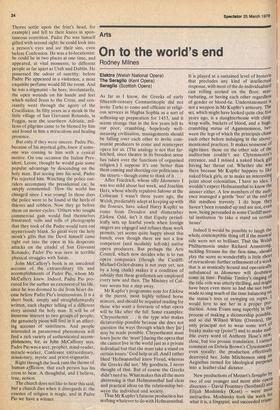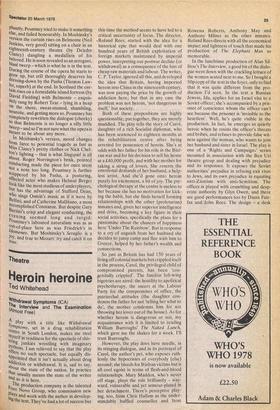Arts
On to the world's end
Rodney Milnes
Elektra (Welsh National Opera) The Seraglio (Kent Opera) Seraglio (Scottish Opera)
As far as I know, the Greeks of early fifteenth-century Constantinople did not invite Turks to come and officiate at religious services in Haghia Sophia as a sort of softening-up preparation for 1453, and it seems strange that in the few years left to our poor, crumbling, hopelessly wellmeaning civilisation, managements should be falling over each other to invite communist producers to come and reinterpret opera for us. (The analogy is not that farfetched, since theatre in its broadest sense has taken over the functions of organised religion.) I suppose it's one better than them coming and shooting our politicians in the streets — though come to think of it. . .
After Friedrich, whose silly Idomeneo was too mild about last week, and Joachim Herz, whose wholly repulsive Salome at the Coliseum I wasn't three years ago, the Welsh, predictably adept at keeping up with the Joneses, have asked Harry Kupfer to come from Dresden and dismember Elektra. Odd, isn't it that Equity periodically sets up fearful yowls when foreign singers are engaged and refuses them work permits, yet seems quite happy about this bunch, even though there are not a few competent (and modishly left-ish) native opera producers. But perhaps the Arts Council, which now decides who is to run opera companies (though the CardiffMichael-Geliot-drama is not over yet, not by a long chalk) makes it a condition of subsidy that these gentlemen are employed every now and then. The Ministry of Culture seems but a step away.
Mr Kupfer's programme note for Elektra is the purest, most highly refined horse manure, and should be required reading for those who want a foretaste of what opera will be like after the fall. Some examples: `Chrysothemis . . . is the type who makes dictatorship possible because she does not question the ways through which they [sic may be made possible. Chrysothemis must learn [note the 'muse] during the opera that she cannot live in the world just as a private individual but that she must take a stand on certain issues.' God help us all. And! rather liked 'Hofmannsthal knew Freud, whereas the Greeks did not.' My goodness, I never thought of that. But of course the Greeks didn't need to. What makes this all the more distressing is that Hofmannsthal had clear and practical ideas on the relationship between the individual and society.
Thus Mr Kupfer's fatuous production has nothing whatever to do with Hofmannsthal.
It is played at a sustained level of hysteria that precludes any kind of intellectual response, with most of the de-individualised cast rolling arotind on the floor, masturbating, or having each other regardless of gender or blood-tie. Understatement Is not a weapon in Mr Kupfer's armoury. The set, which might have looked quite chic five years ago, is a slaughterhouse with cling wrap walls, buckets of blood, and a huge, crumbling statue of Agammemnon, between the legs of which the principals chase each other before indulging in the above mentioned practices. It makes nonsense of sight-lines: those on the other side of the auditorium couldn't see Clytemnestra's entrance, and I missed a naked black girl having her throat cut. Whether she Was there because Mr Kupfer happens to like naked black girls, or to make an interesting point about colonialism, I have no idea. I wouldn't expect Hofmannsthal to know the answer either. A few members of the audience managed a gentle `boo' at the end of this mindless travesty. I do hope they haven't been rounded up and are not, even now, being persuaded in some Cardiff mei!' tal institution `to take a stand on certain issues'.
Indeed it would be possible to laugh the whole contemptible thing off if the musical side were not so brilliant. That the Welsh Philharmonia under Richard Armstrong, tackling Strauss for the first time, should play the score so wonderfnlly is little short of miraculous: further refinement of a work that is as musically fecund and operaticallY unbalanced as Idomeneo will doubtless come in time. Pauline Tinsley's singing of the title-role was utterly thrilling, and might have been even more so had she not been made to sing much of the time balancing 011,.. the statue's toes or swinging on ropes. .1 would love to see her in a proper production. Anne Evans sang superbly in the process of making a dictatorship possible, and so did Willard White (Orestes), the only principal not to wear some sort of freaky make-up (point?) and to make aud" ible every word of Anthony Hose's new' close, but too prosaic translation. I cannot comment on Debria Brown's Clytemnestra even vocally: the production effectively destroyed her, John Mitchenson sang a° Aegisthus turned for ideological purPoses into a leather-clad dictator.
New productions of Mozart's Seraglio by two of our younger and more able directors — David Pountney (Scotland) arw. Elijah Moshinsky (Kent) — were 111°s' instructive. Moshinsky took the work for what it is, a Singspiel, and succeeded Multi' phantly, Pountney tried to make it something else, and failed honourably. In Moshinsky's version the curtain rises on Belmonte (Neil Jenkins, very good) sitting on a chair in an eighteenth-century theatre (by Deirdre Clancy) dangling a medallion of his beloved. He is soon revealed as an arrogant, blasé twerp —which is what he is in the text. During the course of the opera he starts to grOW up, but still thoroughly deserves his dressing-down by the Pasha (Thomas Lawlor, superb) at the end. In Scotland the curtain rises on a formidable island fortress (by David Fielding) with Belmonte — exquisitely sung by Robert Tear — lying in a heap en the shore, sweat-stained, shambling, neurotic, and getting more so. Pountney has completely rewritten the dialogue (cheeky) so that Belmonte is no longer a silly little twerp— and so I'm not sure what the opera is Meant to be about any more. In MOshinsky's version, mood changes from farce to potential tragedy as fast as iviiss Clancy's pretty clothes or Nick Chelton's lighting — that is what Singspiel is all about. Roger Norrington's brisk, pointed Conducting made the piece for once seem not a note too long. Pountney is further ac,tiPPered by his Pasha, a posturing, affected actor who makes Helmut Berger look like the most studious of underplayers, but has the advantage of Stafford Dean, who sings Osmin's music as if it were by Bellini, and of Catherine Malfitano, a most accomplished Constanze. But despite Gary Elertini's crisp and elegant conducting, the evening seemed long and turgid: Eountney's laboured naturalism was as as 011t-of-place here as was Friedrich's in 'Marlene°. But Moshinsky's Seraglio is a Joy, and true to Mozart: try and catch it on tour,



































 Previous page
Previous page